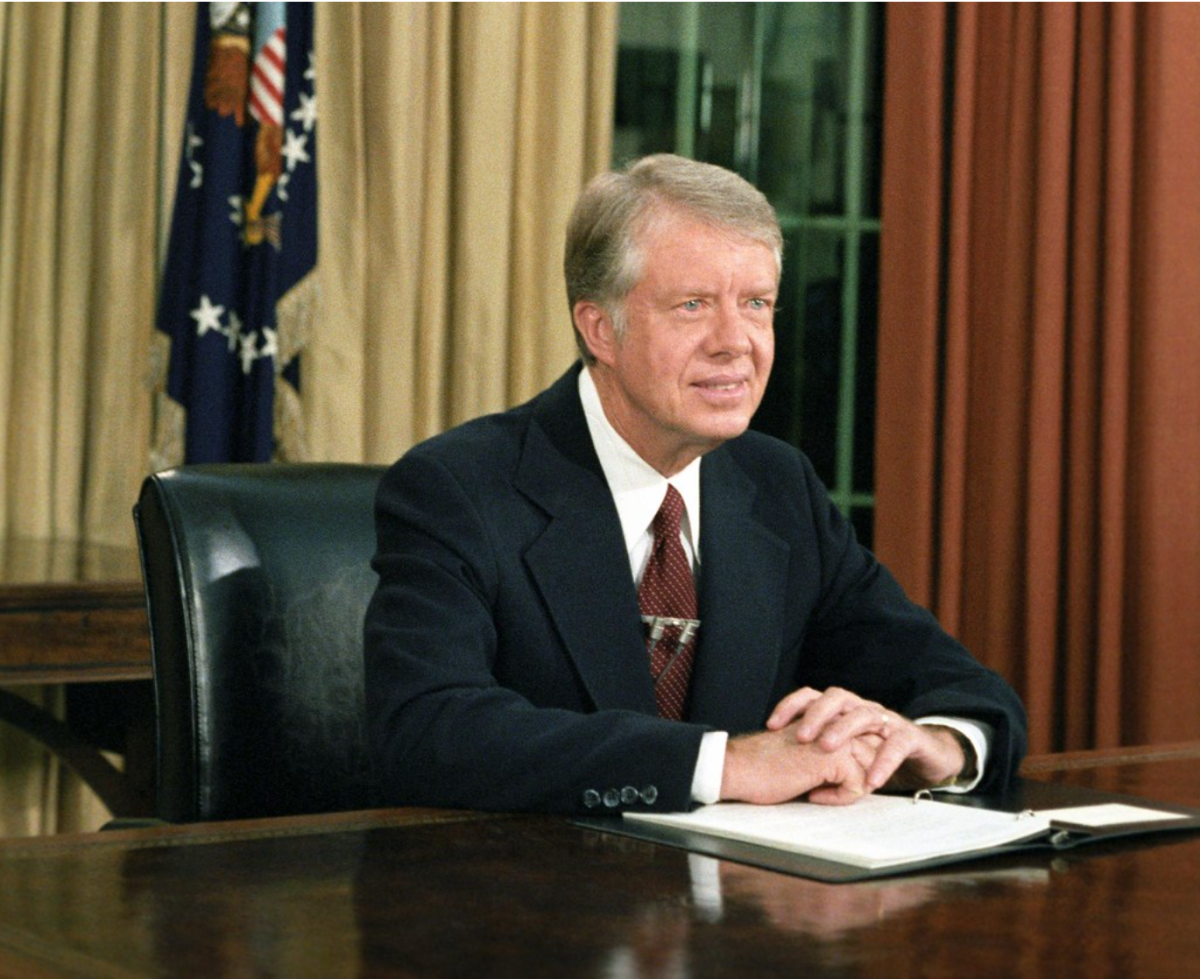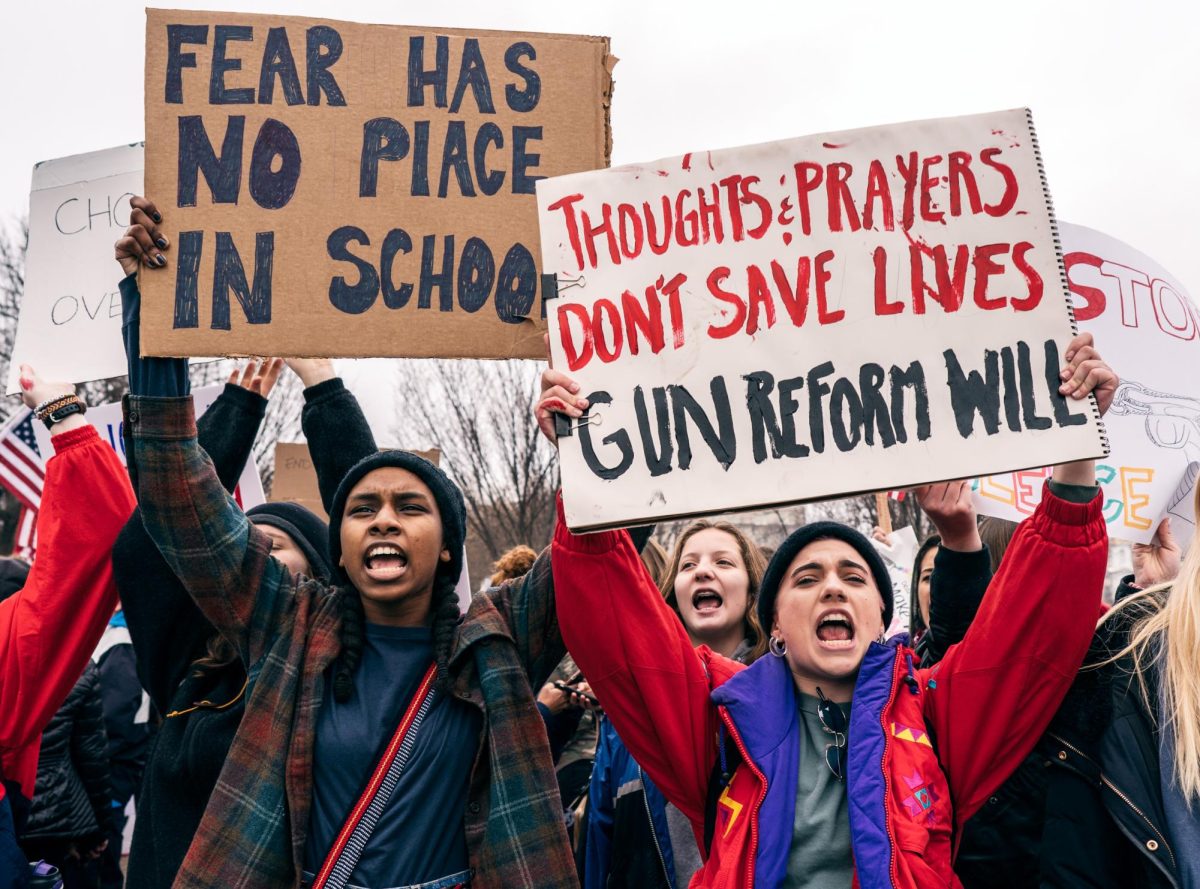“I’ll never tell a lie.”
Those words were spoken by Former US President Jimmy Carter, one of the few presidents who truly embody the people they serve. Elected to only one term, President Carter could have continued to change America for the better if he had been re-elected. Despite his character and strong sense of moral values, his nomination by the Democratic Party for President of the United States was unexpected by many. His presidency had successes that still affect us all today. And his post presidency is the most significant one of any president in American history.
Carter grew up in rural Georgia in a hard-working family, which instilled perseverance in him. He carried this trait into the White House. From a very young age Carter received two different core values from his parents as explained by the narrator, Linda Hunt, in the PBS American Experience documentary: “Lillian set for Jimmy the example of service to others. Earl put the steel in his character.” During his adult life these characteristics stuck with him. Later, as his father was dying, he returned home to Georgia from the Navy and took over the family farm. He left his career to continue on the legacy of his father, the family farm.
While back home in Georgia, racial tensions throughout America and especially in the South, were on the rise. Carter was approached by a man saying that he would pay for Carter’s fee to join a white supremisist group called The White Citizens Council. “I think Jimmy told him he could flush his money down the john. But anyway, Jimmy refused to do that and we lost some customers,” Rosalynn Carter, Jimmy Carter’s wife, recalled. He risked his business in order to be on the right side of history. Carter showed true independence of thought and action, which is what we need in leadership.
After a successful run for the Georgia state senate and for Governor, Carter decided to run for president. Hunt says that “Before any other candidates were even announced, Carter had traveled more than fifty thousand miles, visited thirty seven states and delivered more than 200 speeches.” Carter campaigned hard in the Iowa caucuses, which helped determine the party’s nominee for president.When Carter won Iowa nobody running against him seemed to take his win too seriously. Carter also ended up winning Florida. He did better than many others could against his opponents there because he was from that area of the country. His actions during his run for the Democratic Party’s nomination for president in 1976 shows us his determination and work ethic since he was the underdog his entire life.
On election day, Carter’s victory was announced at 3:00 A.M in one of the closest elections in American history. He started his presidency bucking tradition. He stepped out of his limousine with his wife and walked the inaugural route. “Carter led by example. He curtailed the use of limousines, canceled magazine subscriptions, unplugged television sets, and put the Presidential yacht, Sequoia, on the auction block,” Hunt says. Just like his days back in the governor’s mansion he and congress did not get along and their relationship deteriorated each day. Carter’s trendsetting ways, more frugal lifestyle and unwillingness to cooperate with Washington norms led to this frosty relationship. Although unpopular in congress, by June, Carter’s fifty one percent victory seemed far behind him. His approval rating was now over seventy percent.
Though his presidency had later been weakened, President Carter continued on working and creating history. “In his first year alone, he met more than 40 heads of state, resumed talks on diplomatic relations with China, and with the Soviet Union on arms control. He launched a new peace process in the Middle East and signed a new canal treaty with Panama, transferring after 75 years, ownership of the canal to the Panamanians,” Hunt explained. He changed American foreign policy forever, prioritizing human rights around the world.
Foreign policy was both the most important and successful part of his presidency and part of his downfall. Arguably, the greatest accomplishment of the Carter administration was the peace deal between Israel and Egypt. He invited Prime Minister Menachem Begin of Israel and Egyptian President Anwar Sadat to Camp David to discuss an agreement Carter had prepared. “He had studied things so carefully. He knew the population of every village in the West Bank and Israel. It’s hard to think of a President in our history who had that much capacity to absorb and retain detail,” said historian Gaddis Smith. Carter’s commitment to knowing everything possible about the situations he dealt with demonstrated what every president should do in a situation of importance. After many days of disagreement and argument Carter, Sadat, and Begin agreed on The Camp David Accords presented by Carter to the two leaders.
At the signing of The Camp David Accords Carter stated, “These negotiations provide that Israel may live in peace within secure and recognized borders, and this great aspiration of Israel has been certified, without constraint, with the greatest degree of enthusiasm, by President Sadat, the leader of one of the greatest nations on earth.” This historical accomplishment should not be undervalued. As Douglas Brinkley stated, “There will never be a history in the Middle East without Jimmy Carter’s name in the index. A hundred years from now, two hundred years from now, people will be talking about the Camp David process that began in those Maryland mountains.”
While Sadat and Begin won Nobel prizes, Carter’s approval among the American people remained low. Hunt states, “In one year, the American economy had spun out of control. Gasoline prices had more than doubled, mortgage rates pushed twenty percent, unemployment kept rising.” His approval rating of 25%, was lower than Nixon’s during the Watergate scandal. He faced a liberal Presidential primary challenge from the Senator from Massachusetts, Ted Kennedy, brother of assassinated President John F Kennedy and brother to assassinated New York Senator and Former Attorney General Robert “Bobby” Kennedy. Though he survived that political battle and won the nomination for President again, he would not be so lucky later.
Then, the event that practically ended Carter’s presidency materialized. Known as the Iran Hostage Crisis, United States hostages were taken by Iranians due to the United State’s support of the Shah, the former leader who was driven out of the country. The Iranians demanded the release of the Shah who was receiving medical treatment in the United States because he was a close ally to America. Carter responded that “The United States of America will not yield to international terrorism or blackmail.” His presidency ended with none of the hostages returned and in the election of 1980 Jimmy Carter lost in a landslide. He won only six states and the Democratic Party lost the United States Senate for the first time since 1952. President Carter stayed up the entire night prior to the inauguration of his opponent President-Elect Ronald Reagan to try to release the hostages.
Carter is everything we want in a President, an honest man, a man who will try, even when the odds are stacked against him, a moral man, and a man of the people. His legacy is mixed, but if he were re-elected in 1980 we would be living in a much more modern, much better America. He went from being a poor farmer in Georgia to wielding great power in the most powerful nation in the world. He served not for his own legacy or for his own name, but to help others and to do good. If Carter had remained President I believe that we would be living in a more peaceful and energy efficient America, with much less political polarization and more tolerance for others and their beliefs. We would see a much more advanced and safer world with more peace and less war due to the foreign policy successes that could have happened if he was re-elected.
















Abdullah Tanis • Nov 9, 2023 at 10:20 am
Bruh why’d you leave out that the shah was the former king of Iran and was wanted for his crimes. He was wanted because most Iranians hated him for being a dictator, that’s kinda necessary context for why post-revolutionary Iran wanted him in the first place